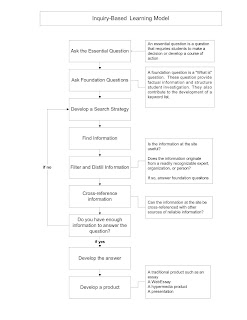In inquiry-based learning, asking questions is fundamental. I encouraged questioning throughout my information learning activity and modelled different types of questions. I found modelling a variety of question types assisted students to improve their questioning skills over the unit.
Students have inquiring minds but often find it difficult to verbalise what they are thinking. I believe this might be due to an overwhelming amount of information causing them to have difficulty sorting it in their minds. I find when I don’t have a clear understanding of a task, writing down questions helps me to clarify what it is that I understand and what exactly I am unclear about. During my own information quest I found that I used questioning to help me sort out the confusion I felt at the early stages of my inquiry.
Lupton, M. (2010). CLN646 Learning Hubs: Week 3 [Readings]. Retrieved from http://blackboard.qut.edu.au/webapps/portal/frameset.jsp?tab_tab_group_id=_2_1&url=%2Fwebapps%2Fblackboard%2Fexecute%2Flauncher%3Ftype%3DCourse%26id%3D_62532_1%26url%3D
Students have inquiring minds but often find it difficult to verbalise what they are thinking. I believe this might be due to an overwhelming amount of information causing them to have difficulty sorting it in their minds. I find when I don’t have a clear understanding of a task, writing down questions helps me to clarify what it is that I understand and what exactly I am unclear about. During my own information quest I found that I used questioning to help me sort out the confusion I felt at the early stages of my inquiry.
Science inquiry, involving questioning, is the focus of Bell et all (2005) in the article “Simplifying inquiry instruction” where different levels of inquiry are outlined. The belief that inquiry must involve data analysis, not just searching library or internet resources, is discussed. This belief is in contrast to other researchers who believe that library searches are inquiry learning.
The levels of inquiry outlined by Bell et all (2005) are: Confirmation (level 1 - lowest), Structured (level 2), Guided Inquiry (level 3) and Open Inquiry (level 4 - entirely student directed). After reading this article I believe that my Information Learning Activity involved elements at both the Structured and Guided Inquiry levels. At times students were instructed to investigate a specific question in a way specified by myself(Structured inquiry). Students also were involved in investigating a question presented by myself but they were to design the procedures that they would use for the investigation(Guided inquiry).
Initially I found the terms inquiry-based learning, information literacy, guided inquiry and science literacy all quite confusing. I remembered a flow chart that once helped me understand the terms inquiry-based learning and information literacy. I found that this chart in conjunction with this article helped me understand the different types of inquiry and was useful in helping me organise my thoughts around the type of Information Learning Activity I wanted to develop and the types of outcomes I hoped to achieve.
(Lupton 2010)
(Lupton 2010)
References:
Bell, R; Smetana, L & Binns, I. (2005). Simplyfying inquiry instruction The Science Teacher, 72 (7), 30-33. [CMD]
Lupton, M. (2010). CLN646 Learning Hubs: Week 3 [Readings]. Retrieved from http://blackboard.qut.edu.au/webapps/portal/frameset.jsp?tab_tab_group_id=_2_1&url=%2Fwebapps%2Fblackboard%2Fexecute%2Flauncher%3Ftype%3DCourse%26id%3D_62532_1%26url%3D


No comments:
Post a Comment